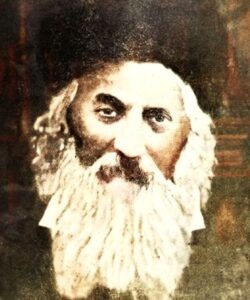
At the beginning of the year, when The Bible Project decided to teach about the Sermon on the Mount this year, I shared a reflection about it, that the overall theme is hasidut (ha-see-DOOT), which means to walk closely with God and to be utterly obedient to him.1
This means that instead of asking how little you can do, ask how much you can do to please your Father in Heaven. The word is related to hesed (HEH-sed), which describes unfailing loyalty and loving-kindness. A hasid (ha-SEED) is a person who is exceptionally dedicated to pleasing God. The word hasidut describes a way of life of utter loyalty to God.
The way that Jesus preached this in the Sermon on the Mount was by making repeated statements about “You have heard it said…but I say unto you…” Historically, these are called “antitheses” because Jesus seems to be contradicting what his audience had known before.
Ironically, these lines have often been used by Christian expositors to force a wedge between Jesus and Judaism by accusing his audience of a foolish legalism that Jesus wanted to set them free from. But when you actually listen closely to his words, this is not what’s going on. In fact, Jesus was calling his listeners to a higher ethic of behavior than even that commanded in the Torah!
Where does Jesus get his emphasis on hasidut?
 The concept of hasidut was actually made famous in the 18th century by Rabbi Israel ben Eliezer (the “Baal Shem Tov“), who led a movement of Jews in Ukraine who wanted to live as hasidim (ha-see-DEEM), pious ones. This is where we get the term “Hasidic” Jews. 2
The concept of hasidut was actually made famous in the 18th century by Rabbi Israel ben Eliezer (the “Baal Shem Tov“), who led a movement of Jews in Ukraine who wanted to live as hasidim (ha-see-DEEM), pious ones. This is where we get the term “Hasidic” Jews. 2
When I first wrote about hasidut in Sitting at the Feet of Rabbi Jesus, I thought that I was creatively stretching this later rabbinic idea backwards to apply it to Jesus. But recently I was happily surprised to discover that this is not true.
While the word hasidut was coined later, the idea of “going beyond the minimum” actually comes from the Torah itself. The section of the Torah where we find this quite frequently is in Leviticus, chapter 19!
The whole chapter is called the “holiness code” and it is an exposition of the principle that it states at the beginning: “You shall be holy, for I the LORD your God am holy.” (Lev. 19:2) Leviticus 19 includes many important ethical teachings like the even greatest commandment, Leviticus 19:18, “Love your neighbor as yourself.” Below I will share just a few other examples of how its ethics challenge us to go beyond.
Going beyond “Honor your Father and Mother”
Just listen to some of the things that Leviticus 19 says. The first thing it says in verse 3 is:
Each of you shall revere (literally, “fear”) your mother and your father…3
Obviously, this is a restatement of the commandment to honor your father and mother. (Ex. 20:12) But it actually intensifies the commandment. Don’t just show honor to your parents, but revere them.4 It’s not enough to obey them and act respectfully toward them. We are challenged to see our parent’s instruction as God’s own guidance to form us into his people.
What’s especially surprising here is that “mother” is listed before “father.” In almost every other biblical text, father comes first. What could this mean but that reverence toward mothers is important too?
In Hebrew, this message is being heightened in yet another way. This line literally reads, “A man (ish) shall revere his mother and his father.” This reinforces that men specifically are the subject, unlike “honor your father and mother” which applies to all hearers.
 You could even frame this command as an antithesis:
You could even frame this command as an antithesis:
You have heard it said, “Honor your father and mother,” but I say unto you, “Each of you, even men, should revere both your mother and your father!”
Every man had a mother that he was obligated to revere. And most women had children, including sons. That means that most women had at least one man in their lives who was obligated to revere her!
This command should lead to women being treated with great honor and respect, don’t you think?
Going beyond “Do Not Steal”
Many of the ten commandments are strengthened in Leviticus 19, as God teaches Israel how to go beyond doing just the bare minimum.
Leviticus 19:11 begins with “You shall not steal,” reiterating another of the commandments. But then it is expanded with “Don’t deal falsely with others or lie to each other either.” Cheating people in business dealings is a way of stealing from them, as well as even lying to them. Later rabbis even made this connection explicit – calling verbal deception genivat da’at, which means “stealing the mind.” They commented, “There are seven types of stealing, and the worst of them is stealing the mind.”5

The theme of stealing is developed in another way in the next verse, (19:13) which says, “Don’t oppress your neighbor or rob him. Do not hold back the wages that you owe him even until the next morning.”
In a subsistence economy, the money earned by a day laborer is needed in order to buy supper to eat that evening. When payment is held back, it’s not just stealing, it’s oppressing laborers who are dependent on their employers for their pay.
If you want to be holy, and therefore utterly honest with money, you should not just not steal, but go beyond the minimum and make sure to pay your workers promptly too. And be honest with your words to others too!
Do Not Insult a Deaf Person
There was a law against insulting one’s father or mother (Ex. 21:17) and its importance was obvious. But in Leviticus 19:14 it says, “You shall not insult the deaf or put a stumbling block before the blind.” What does it matter what you say to a deaf person if they can’t hear you?
The point here is that insults shouldn’t even come out of your mouth, whether or not a person can hear them. God doesn’t want to hear them at all! It’s more about what these words do to your own heart than they do to the other person.

All the way back in Leviticus we find the beginning of the overriding theme of the Sermon on the Mount — that we need to watch the state of our hearts long before we get close to sinful actions. It’s not enough not to commit adultery, we need to rid our hearts of lust. Our hearts are the source of our actions and are God’s main concern.
In this command about insulting the deaf, we also hear God’s desire to protect those with disabilities, which might surprise modern readers. In the ancient world, the pervasive belief that illness was caused by sin made it all the more likely that a deaf person would be insulted, or a blind person teased and abused, since their suffering was assumed to be their own fault.
Yet here in Leviticus, God voices his concern for the dignity of the disabled, that they should be valued and treated as fellow image-bearers of God.
This command ends with the words, “…but fear the Lord. I am the Lord.” These phrases are added to commands against sins that could be committed in secret. If you trip a blind man, he might not know who did it, but God certainly does! Obedience comes out of reverence for God.
Be Perfect, Be Holy
These are just a few of the ways that Leviticus 19 expands and deepens the commands of the Decalogue and the Torah and brings them to higher level. There are more! But this is enough to show that Jesus had the Torah itself as a model of hasidut – going beyond the minimum to do what ever it takes to please a loving God.
One clue that Leviticus 19 was part of Jesus’ inspiration for the Sermon on the Mount can be found in Matthew 5:48:
“Be perfect, as your Heavenly Father is perfect.”
Here he reiterates the beginning statement Leviticus 19:2 that states God’s overall goal:
“You shall be holy, for I the LORD your God am holy.”
We need to aim to go beyond!
~~~~~
1 My earlier article, “The Sermon on the Mount is about *Hasidut*” was based on an excerpt from my book Sitting at the Feet of Rabbi Jesus (Grand Rapids: Zondervan, 2009) in chapter 12, “Jesus and the Torah,” pp 183-185.
2 An earlier movement like this occurred within Judaism about century before Jesus’ time. The members of this group were also known as hasidim by other Jews too. They were known for their extreme generosity toward the poor and their prayerful walk with God. Instead of stressing the study of Torah as the Pharisees did, they stressed the doing of the Torah to ones uttermost.
Jewish scholar Shmuel Safrai has pointed out that in many ways Jesus’ lifestyle resembled the hasidim of the first century. You can read his important article, Jesus and the Hasidim in Jerusalem Perspective. It is behind a paywall but well worth the cost of $1.99.
One of the hasidim was Honi the Circle Drawer, (Honi HaMa’agel) who lived in the first century BC. During a drought, he pleaded with God for rain by drawing a circle around himself and saying, “I’m not going to leave until you give your people rain!” The leader of the Sanhedrin wanted to excommunicate him for his brashness toward God, but decided not to since God showed his approval by answering his prayer. (B. Talmud, Taanit 19a) The popular book The Circle Maker by Mark Batterson was based on this story (Grand Rapids: Zondervan, 2011).
Another hasid was Hanina Ben Dosa, who lived in the Galilee toward the end of the first century AD. He was also well known for his prayerful life and extravagant generosity to the needy, which made his family very poor too. I adapted a hilarious story about him in this article: The Parable of the Golden Table Leg.
3 It should be noted that Lev. 19:3 ends with “…and you shall keep my Sabbaths: I am the Lord.” In this article I’m only focusing on the first half of the verse.
4 This is the Hebrew verb “yareh” which can be either negative (fear) or positive (respect, revere). I’ve written about the broadness of this verb in Does God want us to Fear Him?
 5 I discuss this in this article at the En-Gedi Resource Center: Ganav: Another Way to Steal. I also discuss genivat da’at in chapter 7, “How to Have a Kosher Mouth” in Walking in the Dust of Rabbi Jesus, on pages 100-101.
5 I discuss this in this article at the En-Gedi Resource Center: Ganav: Another Way to Steal. I also discuss genivat da’at in chapter 7, “How to Have a Kosher Mouth” in Walking in the Dust of Rabbi Jesus, on pages 100-101.
William Stokes says
I am curious mostly regarding things I did not know about Jesus. Your report implies there is territories between ‘perfect’ and ‘holy’ but then-you didn’t go there. A bell went off for me.
Lois Tverberg says
Jesus was not speaking Greek or English, but Hebrew. His words were translated into Greek – he didn’t think them in that language. Holiness or blamelessness was on his mind, not Greek notions of absolute perfection, which are foreign to his Jewish teaching style that builds on the Torah and Prophets.
Bruce Lyon says
I believe the creed of the lord Messiah Yehoshua – Jesus is: Love Yehovah – God with all your heart, mind and being and strength and love your neighbor as yourself. All the rest is commentary on how to do that!
Lois Tverberg says
You’ve just quoted Jesus as he has quoted two other verses in the Torah, Deut 6:5 and Lev. 19:18. According to you, Jesus’s creed comes from the Torah too, not just the Sermon on the Mount.
Sarah Cilk says
Great insights. Thank you! Our pastor is currently doing a series on The Sermon On the Mount, so I forwarded him this article. Always encouraged by your insights and studies.
Sue Broughton says
Your insightfulness not only fills me with new perspective but gives a greater desire to live my life more intentionally as His image-bearer. Thank you.
Judy says
I’d like to do a personal Bible study of the Beatitudes. Will you please recommend a resource (s) that I can study? I truly want to walk closely with Jesus and to be obedient to Him.
Thank you!
Lois Tverberg says
Dear Judy, I wrote several articles related to the Beatitudes on the En-Gedi Resource Center website. The Beatitudes are hard for us to understand because they are so very Jewish. I have a page where I have many articles on “Puzzling Passages” where you find these:
Blessed Are…
The Poor in Spirit
Blessed Are the Mourners
The Meek Shall Inherit…
Pursuing Righteousness
Blessed are the Peacemakers
Hope this is helpful.